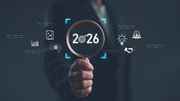Article
Self-service technology doctors up health care, pt. II
Self-service technology, kiosks especially, may be changing the way we access health care and the privacy issues we encounter from the pharmacy desk to the doctor's diagnosis.

August 27, 2014 by Nicole Troxell — Associate Editor, Networld Media Group
This is the second in a two-part look at kiosk and self-service technologies across the spectrum of health care and how self-service is altering the patient-provider landscape.
Part I of "Self-Service technology doctors up health care" took a look at how kiosks are streamlining check-in procedures and providing patients information and opportunities.
Part II begins a look at trends in health self-assessment, telemedicine and potential risks with these changes. It features a video demonstration of a telemedicine kiosk, uses of kiosk software and what industry experts have to say about privacy issues regarding self-service technology.
Assess yourself
Self-service solutions take a do-it-yourself approach that many in the Millennial generation are accustomed to from growing up in the age of information technology. Health screening, or self-service health assessment, is one of those approaches.
The recent partnership of Technicolor company IZ-ON Media with higi and Stayhealthy, both providers of health and wellness technology, built a network of health-screening kiosks in nearly 10,000 locations, according to an IZ-ON press release. The kiosks help users assess blood pressure, BMI, weight and pulse. Customers can integrate their own fitness-tracking device or app with higi's system, which documents their progress. Incentives are given by retail stores for achieving goals. By 2015, 4,100 of its health kiosks will be deployed in Rite Aid stores, with 1,800 more in Publix stores.
A pacemaker self-assessment kiosk has been deployed for University Hospital Southampton's NHS Foundation Trust remote-monitoring pilot study at U.K.-based Bitterne Park Medical Centre. Patients check the status of their pacemakers by following on-screen instructions in a kiosk instead of visiting a doctor, a do-it-yourself approach to routine checkups. Patient data is sent electronically to a health care provider and is accessible remotely. The program is designed to cut waiting times and missed appointments by providing closer and more convenient care to patients.
To address health concerns of a more pressing nature, Northern Ireland's Kinnego Marina near Oxford Island has taken health kiosks on a different path, with an automated emergency defibrillator kiosk, which was converted from a classic British telephone booth as part of BT's Adopt-a-Kiosk program that transforms outdated payphones into something more useful. The life-saving, heated kiosk is accessible to area residents who can dial the Northern Ireland Ambulance Service, which unlocks the kiosk.
Health kiosks also enable a number of personal health assessments that aren't just physical.
The Philadelphia Department of Behavioral and Intellectual disAbility Services, Scattergood Behavioral Health Foundation, Screening for Mental Health and Family Practice and Counseling Network teamed up with grocery chain Shoprite to launch a six-month pilot testing mental health kiosks in the store's primary care center.
"What happens when you go into the kiosk is it will say, 'Are you interested in taking a behavioral health assessment?' and it'll remind you that this is not a diagnosis, it's not an intended substitute for professional advice, diagnosis and treatment," Department of Behavioral Health Special Advisor to the Commissioner for Policy Development and Research Samantha Matlin said in a MobiHealthNews article. "But it’s really a way to take an initial step to see if you may be experiencing symptoms consistent with behavioral health diagnoses."
Users can choose their own assessment from an array of mental health conditions such as depression, anxiety, eating disorders and more. The kiosk provides resources for counseling, family support and peer support.
If the kiosk is effective, the team plans to launch more in ShopRite locations.
Telehealth
Self-assessment stations can also be outfitted for telehealth, which is a kiosk version of a doctor's office that puts patients in contact with physicians remotely.
This is what Sprint Nextel and Ideal Life decided to do in 2011 when they launched their "public versions of telehealth kiosks," according to a Mobile Healthcare Today article.
The kiosks were to be placed in gyms, clinics, libraries, schools and other high-traffic locations. They assess blood pressure, weight, glucose, heart rate, oxygen intake and more. The data is transmitted to a health care provider using Sprint's wireless network and Ideal Life's remote health-monitoring system. The companies hope to "empower" consumers to actively track their health, especially those with chronic illnesses such as asthma and congestive heart failure, the article said.
And then there are purely telemedicine kiosks, a miniature doctor's office in kiosk form. Ohio-based HealthSpot opened one of these in Cleveland's poorest neighborhood, according to an IdeaStream.org article. It's not a full self-service station because technicians are often present to take vitals, but the key ingredient to telemedicine is that the doctor is viewable by screen only — a virtual office visit.
The kiosks cost $60,000, but that's still less expensive than building a doctor's office, Dr. Allan Khoury, a Towers Watson consultant, said in the article.
The future of telemedicine could lie in kiosks replacing doctor's offices, Khoury said.
Check out HealthSpot's demo video of how it works:
Telehealth risks
Dr. Robert Wah, president of the American Medical Association, cautioned about the risks of telemedicine if a doctor doesn't know a patient's history.
"It is a possible concern and a challenge that inadequate or partial information would be available and that would lead to decisions being made that were, you know, not optimal," Wah said in an IdeaStream.org article.
Video stream encryption issues could pose a threat to security, according to Senatara Healthcare Chief Information Security Officer Kathy Jobes. Jobes is also concerned about patient authentication. She worries that it could be possible to impersonate someone to steal personal information or prescriptions. And the vendor cloud data and the vendor company's use of the data could put information at risk for theft. Jobes questions how it would become available for physicians on the move or how it could be destroyed after sharing with other medical providers.
Laura Miller of KioWare said in an email addressing privacy concerns: "On the health care provider side of things, there are numerous examples of health care data breaches due to employee negligence or deliberate privacy violations. This is in direct violation of HIPAA and can be an expensive oversight if an institution's systems are blamed for the data breach." Miller said KioWare is used by hospitals, medical centers, doctor offices, research facilities and health insurance providers to protect patient data from a variety of potential data breach threats, by a variety of means, including:
- Restricting external device access (restricts users from downloading data to a flash drive/USB drive);
- Clearing cache between users (clears user data so kiosk users cannot access previous user data);
- Timing out when not in use (devices lock when a user walks away or times out, to ensure only those that have access to the data are able to view it);
- Restricting website access (restricts users from accessing unapproved websites, not allowing users to copy and forward data to unauthorized personnel, not allowing them to access social media, email accounts or other potential threat sites); and
- Restricting file system access (restricts unauthorized users from viewing sensitive data that lives on the device hard drive or in the device file system).
On the topic of privacy, HealthSpot CEO Steve Cashman said in an email, "Our [kiosk] is fully enclosed and private, with technology woven into the consumer experience, allowing the patient to focus on interacting with their provider. Breakthroughs in technology and connectivity have allowed us to change the health care landscape, bringing the provider to the patient instead of the other way around. By doing this we’ve enabled health professionals to offer solutions that keep health care costs down while increasing patient access to the right quality care at the right time in the right place."
And finally, one of the biggest concerns is the perceived lack of time spent face-to-face with a health care professional. Some worry that diagnoses could be misguided or incorrect for lack of visual information.
Frank Olea, CEO of Olea Kiosks, said on the subject, "One of the common misperceptions about health care kiosks is that they lead to less face-to-face time between patients and health care professionals. As with other unfounded worries, this confusion results from not fully understanding the power of well-applied technology to connect people rather than separate them. Most people would agree that advancing technologies in general have greatly enhanced medical care while saving lives and improving quality of life for patients. As such, kiosks blend together the best technologies for helping people."










